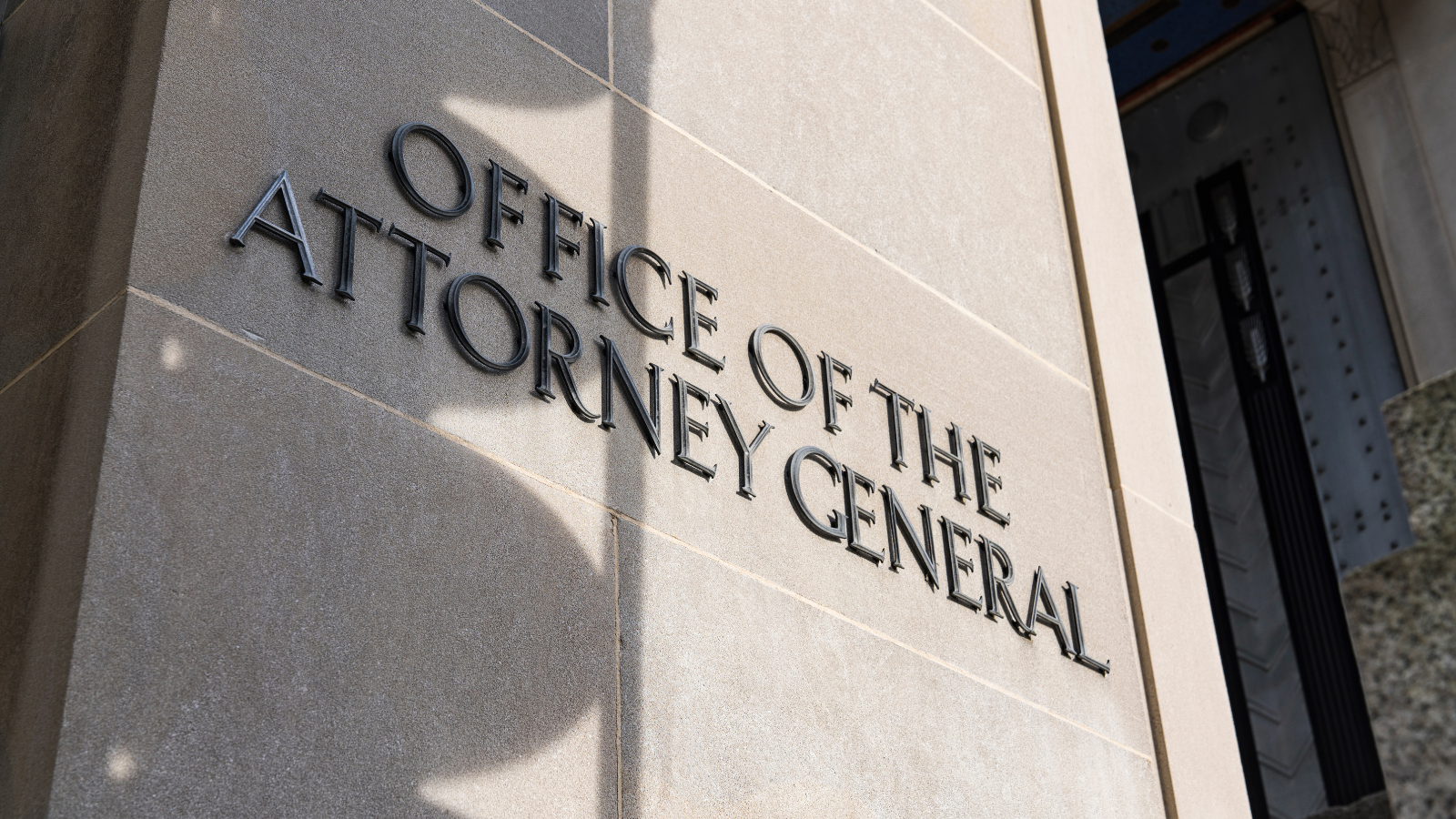Kristy Parker is Special Counsel at Protect Democracy. She leads litigation to secure accountability for abuses of executive power and interference with government functions, and leads advocacy to reform the Department of Justice and protect its independence from politicization.
How to tell whether a government investigation or prosecution is “weaponized”
- May 9, 2023
These key questions can help assess whether a government-led investigation or prosecution is appropriate — or an abuse of power.

Former president Donald Trump is facing criminal investigations and prosecutions across a number of both state and federal jurisdictions. A federal grand jury in the Southern District of Florida has indicted him on charges including willful retention of sensitive national defense information, conspiracy to obstruct justice, and making false statements to federal officials. He was earlier indicted in New York for conduct that allegedly occurred before he was president and is also under investigation for abuses of power while he was president — including efforts to overturn the 2020 presidential election.
In response, Trump and his political allies have claimed that the prosecutors investigating him are “weaponizing” law enforcement for political ends. In doing so, they’re also suggesting that there is something inherently undemocratic about investigating and prosecuting a former president.
The Republican House majority seems to agree. They have created a Committee on the Weaponization of Government for the apparent purpose of intervening in the various investigations of Trump.
Given the obfuscation of these political actors, we’re seeing a number of unhelpful narratives suggesting that “everything is political” and “both sides are to blame” or that conducting investigations of high-ranking political actors somehow impedes the ability of the Attorney General or other lead prosecutors to keep their offices above politics.
But that’s not true.
Against this backdrop, it might be hard to figure out 1) what’s a politicized investigation and 2) what’s a normal and appropriate effort by law enforcement when dealing with possible criminal conduct by a high-ranking political actor. But as a number of high-profile indictments loom, including potential additional indictments of the former president, separating those two things is going to be crucial for the media and for the public. We’ve published a report analyzing these complicated questions.
As the authors, we want to make one thing clear: Accountability for high-ranking people should be normal and proper in a society committed to constraining abuses of power and sustaining the rule of law.
But to combat the rhetoric and misdirection and understand these issues correctly, it’s important to consider the investigations in their proper context and ask the right questions.
Key questions for assessing whether a prosecution is politicizedKey questions for assessing whether a prosecution is politicized
The investigations into former President Trump at both the state and federal levels are anchored in the core democratic principle that no one in our system is above the law.
At the federal level, the Constitution and decades of Justice Department policies and norms strongly counsel that the Department’s law enforcement decisions should be independent from overtly political considerations. From the Constitution itself — through due process and equal protection — to democratic norms reflected in the Department’s White House Contacts policies, to its internal manual on Principles of Federal Prosecution, our system of government is squarely focused on guaranteeing the fair and impartial administration of justice for all Americans.
Importantly, that precedent also emphasizes that politicians are not exempt from prosecution. This doesn’t mean that investigations won’t have political ramifications, but it does mean that prosecutorial decisions should not be made based on the political status, associations, or popularity of any individual.
In recent years, thousands of Justice Department alumni have issued multiple statements affirming these basic principles. Of course, prosecutors should have broad discretion to decide when to charge cases, but those decisions should be based on the evidence: Is there probable cause to believe a crime was committed? Or would anyone else be indicted on similar facts? The decision to charge should not be based on ideas like “what’s best for the nation” — that’s a political decision that is up to the president and the pardon power.
In our rule-of-law based system, it is wrong to use the power of law enforcement to retaliate against a political opponent, but it is equally wrong to refrain from investigating or prosecuting someone because of their political status.
Read More: The Right Questions to Ask About a Trump Prosecution Read More: The Right Questions to Ask About a Trump Prosecution
In light of those considerations, these are the key questions should to ask in evaluating each of the Trump investigations:
What is the publicly available evidence in the case and similarly situated cases?
- Does the evidence in the case meet the elements of one or more federal criminal offenses?
- Relatedly, what is the history of prosecutions for these offenses? Have others been investigated or prosecuted for similar offenses on similar facts?
- Have people who are not politicians been prosecuted for similar or lesser offenses?
- Would it make sense for the Justice Department (or other prosecutor’s office) not to investigate or prosecute if the subject were anyone other than a high-ranking political actor?
Does the Justice Department or local prosecutor’s office have safeguards in place to avoid politicization and does it appear to be following them?
- Has the Justice Department or prosecutor’s office issued guidelines governing influence by or contacts with political actors and are they being observed?
- Has the Justice Department or prosecutor’s office issued policies to prevent election interference and are they being followed?
- Are other internal rules and policies being followed?
- Have the president or other high-ranking political actors in the jurisdiction commented on the prosecution or attempted to interfere in it?
What do the external and internal checks against abuse indicate?
- Have institutions outside of the Justice Department or prosecutor’s office — grand juries, judges — upheld their actions?
- Have any prosecutors or other employees resigned or withdrawn from the investigations, or otherwise objected, because of perceived impropriety?
- Have internal watchdogs (OPR, OIG, state or local review bodies) indicated there is impropriety or cause for concern?
If answers to these questions suggest a crime occurred, that the prosecutor’s office is following policies and procedures appropriately, and that there is no indication of political interference, then the investigation or prosecution is appropriate regardless of the political implications.
Read More: More than 1,000 DOJ Alumni Explain Ongoing Investigations of Trump Should Not Be Deterred by His Presidential Candidacy Read More: More than 1,000 DOJ Alumni Explain Ongoing Investigations of Trump Should Not Be Deterred by His Presidential Candidacy
Key questions for assessing whether a Congressional investigation is politicized
Just as prosecutors at all levels of government have a responsibility to enforce the law based on the facts of each individual case, Congress also has oversight authority to provide a check against federal law enforcement.
In fact, Congress has validly investigated law enforcement, including during the Obama administration.
But there are limits.
First, the Supreme Court has ruled many times confirming Congress’s power to investigate in relation to its power to consider and pass legislation and it has largely refrained from inquiring into the motives behind an investigation so long as legislation is possible. However, the Court has also explained that Congress can’t “expose just for the sake of exposure,” and thus can’t do oversight for transparency alone.
Second, interbranch negotiations serve as a check. Congress needs to balance getting information that helps it do its job against the executive branch’s need to maintain confidentiality over certain types of information. This has meant, in the past, Congress working with the executive branch to narrow requests for information, or receive official testimony in private, or access information in controlled, classified settings.
The third check comes via the Constitution, which makes clear that Congress is not a law enforcement agency and that it can’t use oversight powers to prosecute or punish.
Finally, Congress shouldn’t interfere in the prosecutorial function of the executive branch by inquiring into open investigations. Interference in active criminal cases may undermine the appearance and pursuit of the impartial administration of justice, and it might influence the outcome. Congress, generally, has other ways of gathering information and it should rarely need access to open criminal investigations to do its job. Overseers can usually find what they need somewhere else.
In light of that context, these are the key questions to ask about any new congressional investigation:
Is there a legitimate basis for oversight?
- What is the purpose of the oversight? Is there a legislative purpose?
- If the oversight is directed at state or local law enforcement, is there an acute federal legislative interest that can be served only by inquiring into that state or local law enforcement matter?
- What is the timing of the oversight? Is it taking place during an ongoing investigation or prosecution, or after the fact?
- To the extent Congress is inquiring into an open law enforcement matter, is it necessary for Congress to focus on that matter or are there alternative sources of information for Congress to examine that do not involve an active law enforcement matter?
- Are the relevant members of Congress self-interested beyond conventional political point-scoring and themselves potential subjects of the investigation?
Is Congress following an appropriate process for conducting oversight?
- Is the committee following the established accommodations process or escalating immediately to subpoenas and/or public testimony?
- Have committee members issued statements prejudging the outcome of the inquiry?
- What do the subpoena recipients suggest about the nature of the oversight?
- Are they experts or officials who appear to have relevant information or people more likely to further partisan narratives?
- Are they political appointees or senior, supervisory career officials, as opposed to line attorneys or other lower-level career staff?
- Has the committee taken measures to respect and protect the privacy (personal, financial, and otherwise) of witnesses, subpoena recipients, or other individuals relevant to the inquiry?
Is Congress improperly interfering with law enforcement work the executive branch or local prosecutor should be doing?
- To the extent Congress is conducting an inquiry into an active criminal investigation, are its activities interfering with witnesses or investigative strategy?
- Is a congressional investigation interfering with the exercise of a state’s sovereign power, in tension with the Constitution’s establishment of a system of dual sovereignty between the states and the federal government?
- Is a congressional investigation of state or local law enforcement raising questions about the propriety of an investigation or prosecution that the targets or defendants of those actions are better-positioned to raise in court?
- Is a congressional investigation of state or local law enforcement in furtherance of a federal constitutional mandate, such as the 14th amendment’s prohibition on state passage or enforcement of laws that abridge the privileges or immunities of their citizens or that deny citizens equal protection of the laws?
Criminal investigations of current or former politicians and congressional investigations of the law enforcement operations will of course have political consequences. But that is separate from the question of whether the investigation or oversight is legitimate.
The rule of law in America means the mere fact that a prosecution has political implications is not a reason for prosecutors to decline to pursue it. Any other conclusion would defeat the fundamental principle that no one is above the law.
Related LinksRelated Links
Four misconceptions about Trump’s federal January 6th indictment Four misconceptions about Trump’s federal January 6th indictment
There’s no First Amendment right to defraud the United States government There’s no First Amendment right to defraud the United States government
Trump’s indictment for conspiring to hold onto power is a step forward for democracy Trump’s indictment for conspiring to hold onto power is a step forward for democracy
How to weigh the federal charges against Trump How to weigh the federal charges against Trump
Featured Press
Why It’s No Surprise That Trump Is Being Charged Under a Reconstruction-Era Law
By Ian Bassin and Kristy Parker
Trump’s latest indictment finally holds him to account for 2020 election plot The Guardian, Aug. 1, 2023 Trump’s latest indictment finally holds him to account for 2020 election plot
Opinion | How to Know When a Prosecution Is Political The New York Times, July 26, 2023 Opinion | How to Know When a Prosecution Is Political
Related Content
It can happen here.
We can stop it.
Defeating authoritarianism is going to take all of us. Everyone and every institution has a role to play. Together, we can protect democracy.
Donate
Sign Up for Updates Sign Up for Updates
Explore Careers Explore Careers
How to Protect Democracy How to Protect Democracy





